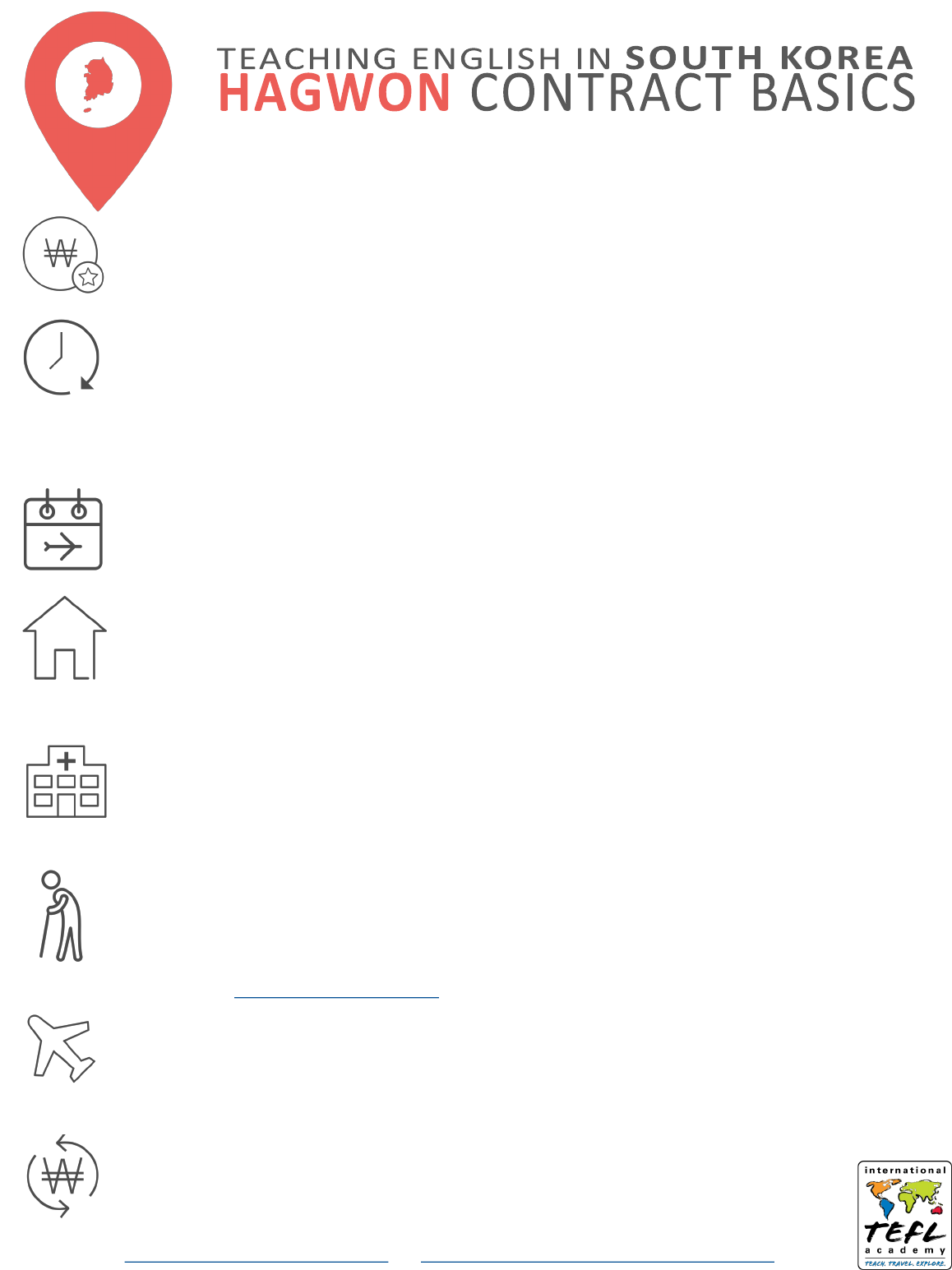
This document covers the basics of English teaching contracts for private language schools (hagwons) in
South Korea. Make sure to take a look at what a standard contract should include and what to expect as
an employee. Remember to always speak to another teacher at the school before accepng a contract.
WORKING HOURS Teaching English in South Korea is a full-me gig. However, there is more than just the total
working hours a week to consider (typically 35—40). Do you have to work in the morning for a few hours and then
come back for more in the evening? Does your school require that you show up an hour before your rst class but not
include that in your total hours? Of the hours you’re at the school each week, how many are teaching hours? It is
common to have hours built into your schedule where you are at the school to plan lessons, grade papers, and possi-
bly develop curriculum. If the school only schedules a few hours a week for you to do this, you might have to take
work home. Generally, teachers in South Korea are in front of students for around 25—30 hours a week of teaching.
SALARY The average starng salary for a rst-year English teacher in South Korea is 2.1—2.2 million won per month.
Anything lower or higher should make you ask a few quesons. When there is a reason for the pay dierence, you may
nd that you’re okay with it. But don’t accept a contract that is paying you less for doing the same amount of work the
average English teacher does, or one that will have you working weekends you planned on having o to travel.
VACATION Before signing any contract, make sure you read through the vacaon policy. You should be provided paid
vacaon me by your employer. You should expect to receive 10 vacaon days a year (typically 5 days during the rst
half and 5 days during the second half of the year, oen scheduled by the school). In addion, you should receive
Korean Naonal Holidays o, which can add on around 10-14 addional days of paid vacaon a year.
HOUSING You will be provided with a furnished studio apartment. The employment contract will cover what is
included (refrigerator, bed, washing machine, and stove) and what you will be required to pay for (ulies like gas,
electricity, heat, water, cable, and internet). Somemes contracts menon providing a monthly housing spend if you
prefer to nd you own housing (not common for rst-year teachers). Occasionally employers will deduct money from
your rst few paychecks as a ‘deposit’ on the apartment which will be returned at the end of the contract provided
there is no damage.
MEDICAL INSURANCE & SICK DAYS You and your employer will each pay half of the cost of Korean Medical Insurance.
Your poron will be deducted monthly from your pay (should be 3% of your salary). In addion to medical insurance,
sick days are oen outlined in contracts. Not all schools oer paid sick days. Most schools require a doctor’s note,
some require teachers to nd a replacement teacher, and other schools deduct pay for each sick day (generally a pro-
rated amount equal to one day’s pay).
PENSION Another monthly deducon split between you and your employer will be the pension (4.5% of your salary
monthly, matched by the school). Teachers from the United States and Canada are eligible for a lump-sum refund for
both the amount they and the school have paid at the me they leave Korea (9% of your total earnings), so make sure
to le the proper paperwork to have the money you’ve paid returned to you aer your contract has been completed.
Note: If your employer signs you up, you can verify that the payments are being properly deposited by your employer
directly with the Naonal Pension Plan in Korea which has an English-speaking hotline.
AIRFARE The airfare benets provided by employers vary from school to school. You should at a minimum receive a
one-way cket at either the beginning or end of your contract, but many schools have policies to pay for round-trip
airfare (either directly purchasing a ight for the teacher from the closest internaonal airport or reimbursing a teach-
er who pays for the ight up front). Many contracts state that if a teacher’s contract is terminated before 6 months
have passed, the cost of the airfare will be deducted from the teacher’s last paycheck.
SEVERANCE Upon compleon of a one year contract employees are entled to severance. Severance is calculated
as pay equal to the averages of wages for at least 30 days, which will work out to one month of wages.
Severance pay is guaranteed in accordance with Korean law and a contract that does not menon
severance pay is technically invalid. Make sure to verify that this is included in your contract before signing.
REFERENCES: Korea Naonal Pension Service website and ‘A Notebook on the Labor Rights of Foreign Workers’
